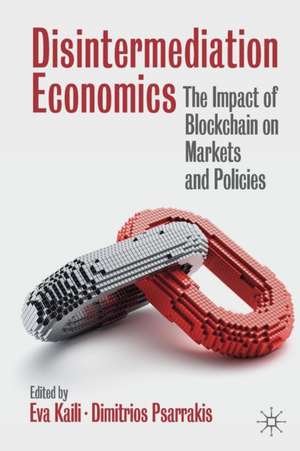Disintermediation Economics: The Impact of Blockchain on Markets and Policies
Editat de Eva Kaili, Dimitrios Psarrakisen Limba Engleză Paperback – iul 2022
| Toate formatele și edițiile | Preț | Express |
|---|---|---|
| Paperback (1) | 201.89 lei 3-5 săpt. | +21.93 lei 4-10 zile |
| Springer International Publishing – iul 2022 | 201.89 lei 3-5 săpt. | +21.93 lei 4-10 zile |
| Hardback (1) | 244.31 lei 3-5 săpt. | +35.13 lei 4-10 zile |
| Springer International Publishing – 30 iun 2021 | 244.31 lei 3-5 săpt. | +35.13 lei 4-10 zile |
Preț: 201.89 lei
Nou
Puncte Express: 303
Preț estimativ în valută:
38.63€ • 40.44$ • 31.97£
38.63€ • 40.44$ • 31.97£
Carte disponibilă
Livrare economică 17-31 martie
Livrare express 28 februarie-06 martie pentru 31.92 lei
Preluare comenzi: 021 569.72.76
Specificații
ISBN-13: 9783030657833
ISBN-10: 3030657833
Pagini: 336
Ilustrații: XVII, 336 p. 17 illus., 12 illus. in color.
Dimensiuni: 155 x 235 x 31 mm
Greutate: 0.5 kg
Ediția:1st ed. 2021
Editura: Springer International Publishing
Colecția Palgrave Macmillan
Locul publicării:Cham, Switzerland
ISBN-10: 3030657833
Pagini: 336
Ilustrații: XVII, 336 p. 17 illus., 12 illus. in color.
Dimensiuni: 155 x 235 x 31 mm
Greutate: 0.5 kg
Ediția:1st ed. 2021
Editura: Springer International Publishing
Colecția Palgrave Macmillan
Locul publicării:Cham, Switzerland
Cuprins
Ch. 1: What is Disintermediation Economics: An introduction (Psarrakis).- Part A: Disintermediation in Microeconomics.- Ch. 2: Distributed Ledger Economics: Organizations, Incentives and Strategy (Psarrakis).- Ch. 3: Economics of Smart Contracts: Efficiency and legal challenges (Dobrauz-Saldapenna and Schrackmann).- Ch. 4: Corporate Strategies for Blockchain-based Solutions (Verheggen).- Ch. 5: Distributed Data Economics (Shrier).-Part B: Disintermediation in Macroeconomics and Finance.- Ch. 6: Blockchain for Growth: Applying distributed ledger technologies to the UN Sustainable goals (Thomason).- Ch. 7: The New Money: The utility of Cryptocurrencies and the need for a New Monetary Policy (Lee and Teo).- Ch. 8: Privately Issued Digital Currencies (Disparte).- Ch. 9: Crypto-assets, Distributed Ledger Technologies and Disintermediation in Finance: Overcoming impediments to scaling: A view from the EU (Noble).- Ch. 10: Crypto-assets and Disintermediation in Finance: A view from Asia (Johnstone).- Part C: Disintermediation in Political Economy and Regulation.- Ch. 11: The Political Economy of the Blockchain (Zilgalvis).- Ch. 12: Regulating Blockchain in the EU: Building a global competitive advantage (Kaili).- Ch. 13: Advancing Digital Transformation in the Public Sector with Blockchain: A view from the European Union (Baldacci and Frade).- Ch. 14: Disposable Identities? Why digital identity matters to blockchain disintermediation and for society (Anania, Le Gars, and van Kranenburg).
Notă biografică
Eva Kaili is a Member of the European Parliament. She is the Chair of the Future of Science and Technology Panel in the European Parliament (STOA) and the Centre for Artificial Intelligence (C4AI), Member of the Committees on Industry, Research and Energy (ITRE), Economic and Monetary Affairs (ECON) and the Special Committee on Artificial Intelligence in a Digital Age (AIDA). She has been working intensively on promoting innovation as a driving force of the establishment of the European Digital Single Market. She has been the draftsperson of legislation in the fields of digital platforms, big data, fintech, AI and cybersecurity, as well as the Rapporteur of the DLT and Blockchain Resolution. She holds a degree in Architecture and Civil Engineering, and a Masters degree in European Politics.
Dimitrios Psarrakis is Financial Technology and Innovation Strategy specialist of the European Parliament. He works on the design of the Digital Finance strategy of the EU and he is the draftsperson of the DLT and Blockchain Resolution of the European Parliament. He is ranked among the 100 top world influencers in the area of RegTech and Blockchain and he is frequent speaker on topics related to FinTech, RegTech, Blockchain and Artificial Intelligence in Europe, America, and Asia. He is also the Director of the Brussels Council, an organization that promotes European high standards of governance and regulation in the digital economy and finance and links the innovation ecosystems of Europe with the rest of the world. He has a graduate degree in Finance from Harvard University.
Dimitrios Psarrakis is Financial Technology and Innovation Strategy specialist of the European Parliament. He works on the design of the Digital Finance strategy of the EU and he is the draftsperson of the DLT and Blockchain Resolution of the European Parliament. He is ranked among the 100 top world influencers in the area of RegTech and Blockchain and he is frequent speaker on topics related to FinTech, RegTech, Blockchain and Artificial Intelligence in Europe, America, and Asia. He is also the Director of the Brussels Council, an organization that promotes European high standards of governance and regulation in the digital economy and finance and links the innovation ecosystems of Europe with the rest of the world. He has a graduate degree in Finance from Harvard University.
Textul de pe ultima copertă
This book provides a coherent Blockchain framework for the business community, governments, and universities structured around microeconomics, macroeconomics, finance, and political economy and identifies how financial markets and governmental policies are changed by digitization, specifically Blockchain. This framework, what they authors call “disintermediation economics,” affects everything by providing a paradigm that transforms the way we organize markets and value chains, financial services, central banking, budgetary policies, innovation ecosystems, government services, and civil society. Bringing together leading and experienced policy makers, corporate practitioners, and academics from top universities, this book offers a road map of best practices that can be immediately useful to firms, policy makers as well as academics by balancing theory with practice.
Caracteristici
Provides a coherent Blockchain framework structured around microeconomics, macroeconomics, and political economy. Brings together leading and experienced policy makers, corporate practitioners, and pioneering academics from top universities. Offers a road map of Blockchain best practices that can be immediately useful to firms, policy makers as well as academics
